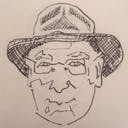
Bertie
I am an ardent fan of my favourite pastime, which is shouting at the wireless. I have mostly my own teeth and can still get myself to the bathroom without too many accidents. I prefer my wine both copious and red.
1620
Writings
348
Followers
0
Following

Bertie
I am an ardent fan of my favourite pastime, which is shouting at the wireless. I have mostly my own teeth and can still get myself to the bathroom without too many accidents. I prefer my wine both copious and red.
1620
Writings
348
Followers
0
Following